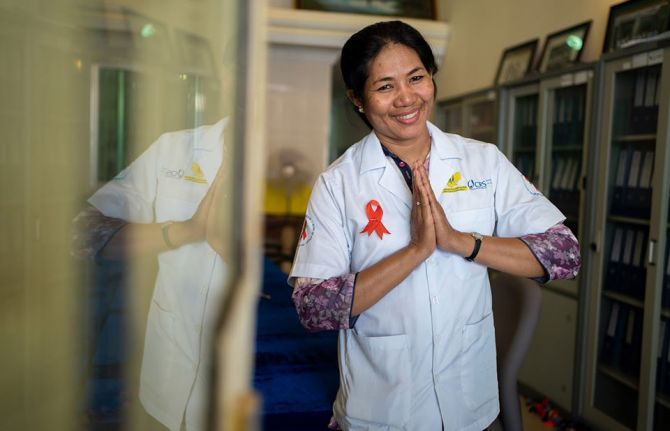

Feature Story
Resources and funding for an effective AIDS response
10 June 2021
10 June 2021 10 June 2021The goal of putting the HIV response on a secure financial footing is a work in progress, with uneven results around the globe towards ensuring a sustainable, fully funded, effective, equitable and gender-sensitive HIV response. The 2020 target to mobilize at least US$ 26 billion for the HIV response was not met. Other targets, such as implementing efficiency measures to optimize the use of existing resources and to clear bottlenecks in scaling up services, were also missed.
A panel, Resources and Funding for an Effective AIDS Response, held on the sidelines of the United Nations High-Level Meeting on AIDS, deliberated on how to reach a sustainable, fully funded, equitable and effective HIV response in a challenging environment for health and development resources.
The panellists surveyed the current situation and key actions for the road ahead, addressing several questions: What does a sustainable, fully funded, equitable and effective HIV response look like? How can the necessary funding levels be secured in the challenging resource environment that we face? What steps can and should we take to improve the impact/effectiveness of the available resources? Are there opportunities that need to be better leveraged within the HIV response, the broader health agenda and the broader development agenda? How can we ensure that we invest in the right interventions for the right populations and places to meet the new global targets and achieve the collective goal of Sustainable Development Goal 3?
Key actions identified by the panellists to guide future efforts include the following:
- Better targeting interventions to achieve equity and impact based on diverse and locally specific needs and goals.
- Approaches and measures to secure the necessary funding mixes, including ongoing international support and appropriate and sustainable domestic funding, and improved equity and efficiency in using those resources.
- Better integration of HIV into other health and development efforts, including universal health coverage, health system strengthening, pandemic preparedness and response and enablers, such as education and social protection, and to better link and leverage those efforts to maximize impact for people living with, at risk of or affected by HIV.
- The importance of ensuring that critical cross-cutting factors, such as gender-sensitivity, eliminating inequalities, leveraging data and prevention, are appropriately supported and integrated throughout.
- The need for shared responsibility, which calls for countries that can pay for their own responses to do so fully, and for those without the ability to pay, to be supported by donors as part of global solidarity.
The panel also examined how investments in the HIV response can help to reduce vulnerabilities and societal inequalities and how to catalyse more effective social spending using a rights-based, people-centred model that empowers individuals and communities.
Finally, the panel situated the discussion in the broader development and fiscal contexts by exploring the economics of HIV, as well as how to tackle inequalities and use people-centred HIV responses to put us on track to reach Sustainable Development Goal 3. It addressed the costs of inaction and complacency, not only for the HIV response but also across the Sustainable Development Goals. Looking at fiscal realities, the panellists provided a broader analysis of the current situation and thoughts on the way forward for protecting and expanding the much-needed fiscal, budgetary and policy space through measures such as tackling public debt distress, tax injustice and illicit financial flows.
Quotes
“In the face of these diversity of challenges, we must remain clear and focused on what must be done to meet the challenge we are here to discuss today. Political leadership, community-led responses and global solidarity must mobilize and effectively use US$ 29 billion dollars annually by 2025 to accelerate progress towards achieving the targets.”
“There is a need to increase our investments in effective prevention and prioritize targeted screening, especially for key populations and vulnerable groups.”
“We all know this epidemic is fuelled by inequity, by discrimination, by human rights-related barriers, by gender-related barriers and we must address those barriers with money and political leadership.”
“We need to make a case for human capital investments in health, including HIV, education and social protection during stimulus and austerity.”
“We have tools that work, but we must use them wisely. Investment is smart and effective only if it is genuinely tailored to the diverse lived experiences. Evidence is essential, accompanied by the obligation to act accordingly.”



